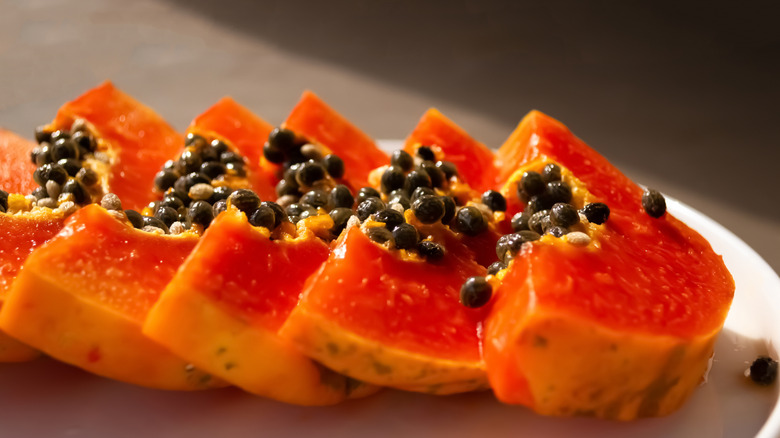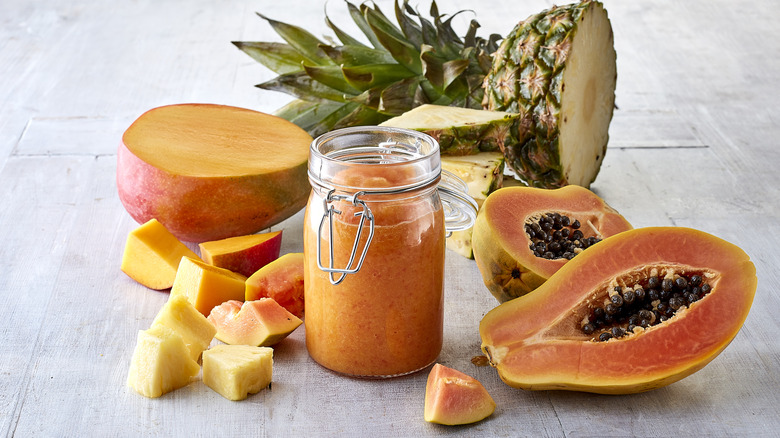An Underrated Orange Fruit High In Antioxidants Can Help You Sleep And Prevent Cancer At The Same Time
Fruit often gets a bad rap these days, especially with so many people following keto and low-carb diets. Sure, some fruits are high in natural sugars, but they also pack essential fiber that helps prevent those dreaded blood sugar spikes. On top of that, fruit is a great source of vitamin C, a powerful antioxidant that helps knock out oxidative stress and inflammation, two major culprits behind chronic disease.
While apples, oranges, and bananas tend to steal the spotlight, don't overlook tropical papaya. With just 62 calories per cup, papaya is a waistline-friendly option that also delivers nearly a full day's worth of vitamin C. You'll also get a nice boost of folate to support healthy cell growth. And if you're a little short on sleep, papaya's 30 milligrams of magnesium can help you reach your daily recommended magnesium.
One nutrient you definitely don't want to miss in papaya is lycopene. Lycopene is what gives papaya its vibrant color and its cancer-fighting power. Tomatoes usually get all the credit for their lycopene content, but papayas are pretty impressive, too. That same cup of papaya gives you 2.65 milligrams of lycopene, which stacks up nicely next to the 3.7 milligrams found in tomatoes.
Papaya's cancer-fighting nutrients
Lycopene is a powerful antioxidant that's even more effective than beta-carotene at neutralizing free radicals, according to a 2022 systematic review in Nutrients. Lycopene can also act as a pro-oxidant, helping the body clear out damaged cells. While some studies have shown mixed results, many have found that lycopene lowers the risk of dying from prostate cancer and helps slow its return. Lycopene has also been shown to enhance the effects of chemotherapy, improve quality of life, and reduce urinary symptoms in people with prostate cancer. Lycopene may even help stabilize PSA (prostate-specific antigen) levels, a common marker of prostate cancer. Plus, people who eat lycopene-rich diets are more likely to survive cancers of the head and neck.
But papaya brings more nutrients than just lycopene. A 2024 review in the Journal of Cancer Prevention found that papaya contains carpaine and capsaicin, two alkaloids that can help prevent cancer and slow tumor growth. Papaya also has saponins that interfere with cancer cell DNA and tannins that neutralize harmful reactive oxygen species (ROS) that can lead to cancer. On top of that, papaya is rich in flavonoids like quercetin and kaempferol, which help calm inflammation in the body.
Unique ways to enjoy papaya
You can enjoy fresh, ripe papaya in a bowl with a squeeze of lime juice or topped with a bit of toasted coconut. Frozen papaya is great in smoothies, adding extra fiber and antioxidants. For a juicy summer treat, slice a papaya in half and place it cut-side down on the grill. After a few minutes, flip it over, sprinkle it with minced ginger and a drizzle of honey, and keep grilling until it's warm and caramelized.
Got an unripe green papaya? No need to wait for it to ripen to enjoy its nutrients. In fact, green papaya has more fiber, magnesium, lycopene, and vitamin C than the ripe kind. Just peel the outer skin with a vegetable peeler, then shred the flesh and toss it into salads for a refreshing crunch (but be careful of the side effects of unripe papaya). Don't toss out the seeds either. They have a peppery flavor and can be used as a spice (but eating papaya seeds won't get rid of parasites).
You might also want to try fermented papaya for its added health benefits. It's made by fermenting papaya in a glass jar with coconut water kefir for 24 hours. According to a 2022 review in Foods, fermented papaya may help protect the brain from Alzheimer's by reducing beta-amyloid buildup and oxidative stress. It may also help ease skin allergies, support gut health, improve cholesterol, and help regulate blood sugar.


